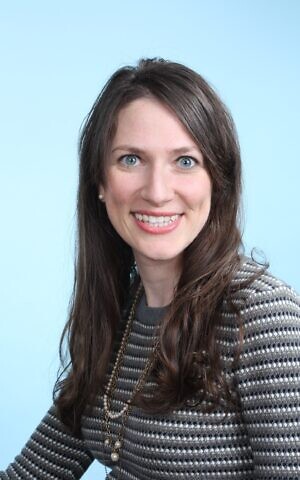Eating Disorders During the High Holy Days
Jewish holidays often center around meals, writes Sarah Bateman, which can bring added stress for those who are struggling with food, eating, or their bodies.
Eating three balanced meals a day plus snacks can be hard enough for anyone to manage, but for those with an eating disorder or in recovery from an eating disorder, it may be especially challenging. Even for people doing well in their recovery, there are decisions, conflicting or negative thoughts, planning, scheduling and financial strains. And if every regular day has the potential for that much stress, it can be that much harder to manage when there is an additional change from the usual routine.
Nothing changes routines quite like holidays. When it comes to the celebration of the Jewish holidays, it is incredibly important to be aware of how those struggling with eating disorders may be triggered. Schedules and timing and priorities are completely altered during the holidays, and especially during the time of the high holidays with so many changes in a row. Yom Kippur can one of the biggest challenges we have, because it is the day of fast. (Note: anyone with an eating disorder should speak to a rabbi and therapist before considering fasting.)

Additionally, Jewish rituals and observances often focus on meals and food and bring added stress for those who are struggling with food, eating, or their bodies. The high holidays can be a very triggering time for anyone with an eating disorder. For Rosh Hashanah, not only do we have complete changes in routine, but we have challah with honey, honey cake, and two days straight of holiday meals for lunch and dinner with countless other holiday treats. Ten days later Yom Kippur, then we have Sukkot and the continuation of holiday feasts for eight more days. This can be a lot for anyone, but especially for people with eating disorders.
Eating disorders are a serious mental illness that can affect anyone, regardless of religion, gender, race, age, or socioeconomic status. Eating disorders have at their root a complex combination of biological, psychological, and cultural factors that are unique to each individual. However, in many close-knit ethnic communities, there is an emphasis on food. That is certainly true within the Jewish culture, where there are rules about what can and cannot be eaten, and every holiday has its ritual foods to eat. For many people, this can be fine (and even fun), but for others it can create an environment that triggers weight or food anxiety.
The break in routine and constant social gatherings revolving around shared meals may feel overwhelming. It may require a level of flexibility an individual struggling with disorder eating may not be used to, perhaps presenting foods that are not otherwise typically eaten.

Flexibility with both food and time may be a challenge. Some people struggle with too much free time and others have a hard time juggling extra responsibilities in their already busy days. The rigidity of an eating disorder can turn these schedule changes into significant stressors.
The High Holy Days may also be a trigger for those having too much time with family, or for others, not having enough family or support. Feelings of stress or loneliness can be particularly difficult when an individual has developed unhealthy coping methods. There may also be added pressure from relatives to consume more food or sit at the table longer than one is comfortable with.
The stress of an eating disorder may cause a person to dread the holidays, and the anticipation alone may become a trigger. Negative associations can compound existing issues and prevent any enjoyment of the holidays altogether, let alone potentially exacerbate eating disorder symptoms.
Some of the common warning signs for the different categories of eating disorders are listed below. Someone may have symptoms of more than one diagnosis or may not fully meet the specific criteria for one of these diagnoses but may still need help. In addition, most individuals are secretive about their behaviors and may go to great lengths not to be found out. No matter the situation, it is critical that individuals seek professional help for an assessment even if they deny that they have a problem.
Anorexia Nervosa
- Is thin and continues to get
thinner - Never reaches a weight that
is satisfactory - Displays perfectionistic
tendencies - Has a distorted body-image —
feels fat even when thin
Bulimia Nervosa
- Has a cycle of bingeing and
purging - Reacts to stress by overeating
- Feels like eating is often out
of control - May purge using laxatives,
over-exercise or vomiting
Binge Eating Disorder
- Eats large amounts of food to the
point of feeling uncomfortably
full - Eats when not physically hungry
- Turns to food as a way of coping
with feelings - Feels disgusted, guilty or embar-
rassed after binge eating
In addition to knowing the signs and symptoms, education is another important factor in preventing and treating eating disorders. There’s so much emphasis on food within Jewish culture at large. However, it’s vital to not place blame on the individual or the families or the culture. It is critical to understand that eating disorders do not go away on their own, they are not just a way to get attention; they are serious mental illnesses. Positive change can come from working to understand what each person finds difficult and focusing on finding ways to manage those challenges while learning how to tolerate their feelings.
For a long time, there was a stigma around getting help for eating disorders in the Jewish community. Increasingly, though, there has been a willingness to get help. There is more awareness and less fear of getting treatment in the Jewish community than there used to be. More communities and schools are openly speaking about eating disorders, and willing to be open about the challenges we see. With reduced stigma and targeted treatment to meet their needs, everyone can have the chance to enjoy the holidays and other important traditions without the added stressors of an eating disorder.

If you or someone you know is struggling with an eating disorder, you can reach out to The Renfrew Center (1800-RENFREW) to relate to a professional who can help.
Sarah Bateman, LCSW, is the Jewish community liaison for The Renfrew Center in Atlanta.
- Yom Kippur
- Community
- Sarah Bateman
- eating disorders
- Jewish Community Liaison
- The Renfrew Center
- In-person
- Virtual
- Day Treatment
- Intensive Outpatient
- Outpatient Services
- jewish community
- Decisions
- conflicting or negative thoughts
- planning
- scheduling
- recovery
- financial strains
- Jewish Holidays
- rabbi
- Therapist
- Fasting
- rosh hashanah
- Sukkot
- Mental Illness
- Flexibility
- High Holy Days
- Anorexia Nervosa
- Bulimia Nervosa
- Binge Eating Disorder




comments